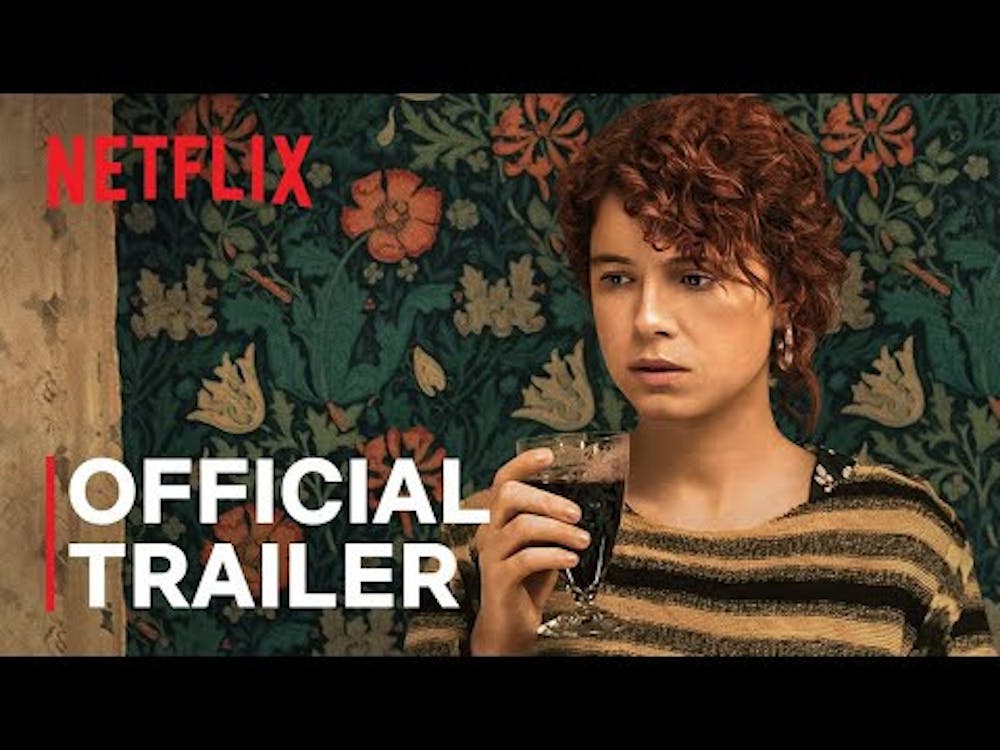Near the beginning of “I’m Thinking of Ending Things,” Lucy (Jessie Buckley) repeats the old joke about how Mussolini kept the trains running on time. Her boyfriend Jake (Jesse Plemmons) swiftly corrects her. The speediness of Italian railways during the 1930s, actually, owed more to the country’s pre-fascist regime. Jake expounds without humility in a flat murmur; his eyes and voice lack self-deprecation as he bloviates. Lucy blinks.
Writer-director Charlie Kauffman’s “I’m Thinking of Ending Things” is about many things, some of which are best left a mystery. Jake and Lucy have been dating for a couple months. They drive through a blizzard to Jake’s parents’ house, where the couple are having a dinner party. After a boozy supper, the pair head back and make an ice cream stop, even though it’s still snowing hard. Three giggling matrons tend the shop, sirens looking onto our roadtrippers. The last act takes place at Jake’s old high school. And even without details, we just know there’s something eerie about this last development: Jake rivals even the kids from “Glee” in how he attains such strange catharsis from revisiting the locker-strewn halls of his adolescence.
But if the film’s fireworks wait until the end, the meat and potatoes of “Ending Things” lies in the long, almost Chekhovian conversations characters have, especially those between Lucy and Jake. As the couple drives through snowy highways, they discuss topics including film criticism, politics, religion and even David Foster Wallace. Meanwhile, interior monologues in Lucy’s head suggest darker undercurrents, and an uncertainty about who Jake is and why she’s been dating him (Buckley is outstanding in these quieter moments).
David Thewlis takes over the film’s middle as Jake’s perpetually band-aided father, a melancholy Englishman somehow stuck in the frosty Midwest. Most famous for playing Remus Lupin in the “Harry Potter” movies, the actor deftly bumbles his way through a similarly tortured role, clad in smudges and unkempt hair as he makes malapropism upon malapropism. Buckley and Thewlis have a deeply uncomfortable rapport during the dinner scene, wherein Thewlis’s character shares some seemingly impromptu criticism of painting, a hobby Buckley’s character enjoys, while simultaneously hitting on his son’s girlfriend.
And so when the characters in the farmhouse begin to shift through time, we aren’t so much surprised as we are relieved: temporal jumps at least lack the ugliness of bad manners. We see hairs pale and then regain color, wheel-chairs roll in and out, baby talk and dribble.“We don’t go into the basement,” whispers one character after telling us about his lonely childhood.
All this weirdness can be admired on an aesthetic level, but one grows weary of cutesiness. Jesse Plemmon brings to the role the same affectless, natural performance that made him such a convincing villain in “Breaking Bad.” And I fully admit, too, that Jake’s character is an interesting creation: a burly, soft-spoken twenty-something whose sweet mannerisms and perpetual slouch are meant to give his critiques of society, art and even his own girlfriend a sense of innate, unappreciated genius.
If only the film’s script weren’t as condescending as Jake’s character.
Throughout the story, Kauffman cuts to the travailles of a high-school janitor (Guy Boyd), taking occasional work breaks to watch a teenage-cast rehearse “Oklahoma.” This, too, distracts us from what could have been a disarmingly simple movie. The last scenes make direct fun of a certain ham-fisted Best Picture winner starring Russel Crowe, but these scenes play out in an equally ham-fisted tone which undermines any wit left in this alphabet soup of a film.
These bouts of intellectual hogwash would have perhaps been more endurable in a theater (God, I miss theaters), where I’d have better appreciated Łukasz Żal’s beautifully sparse cinematography and enjoyed easier access to snacks. But while viewing “I’m Thinking of Ending Things” on Netflix, I found myself checking my watch, surfing the web and, frankly, Thinking of Ending Things with Mr. Kauffman’s film. The writer-director showcases some sharp dialogue and fine acting here, but “Ending Things” ultimately regresses into a gleeful disorganization that, upon reflection, can probably be found in all the film’s scenes.
You have heard it said by Mel Brooks that his show business satire “The Producers” “rose below” mere vulgarity. I say unto you that “I’m Thinking of Ending Things” never quite rises below pretension.
“I’m Thinking of Ending Things”: Condescensions, pretensions and cutesiness in one

Comments



